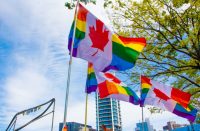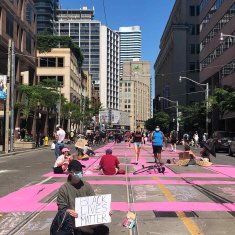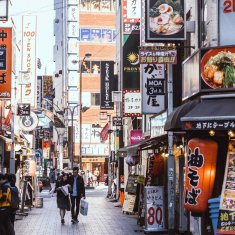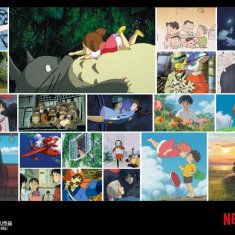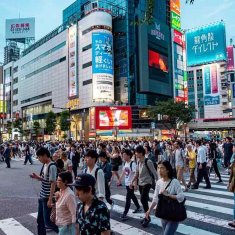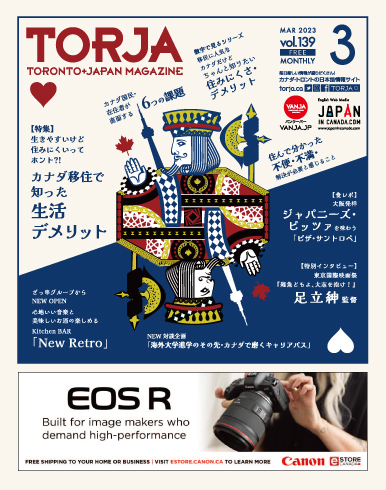March is Women’s History Month, the perfect time to hit play on any one of these amazing songs made for, by, or about Asian women. But please note: this is in no way the definitive list; it’s just a jumping-off point.
VAVA
Chinese rapper Vava is sometimes described as China’s Rihanna. Her popularity has exploded since her appearance on The Rap of China; she has secured her high-profile advertisement deals and become a fashion icon as well as the face of Chinese hip hop across the country.
The 22-year-old rapper from Sichuan province contributed to the film’s soundtrack with her single My New Swag (我的新衣)— originally released in October last year and featured on Crazy Rich Asians soundtrack. After rising to fame in China on a hugely popular hip-hop reality TV show, Vava is now receiving her big international break.
Peggy Gou
Peggy Gou, the 28-year-old South Korean DJ and producer, has a fashion label, a festival and a million Instagram followers – but she told The Guargian, that she’s had to fight hard for it all.
Growing up, Gou was a huge K-pop fan but her musical education really began when she moved to the UK at 14 for school. As a minor, Gou spent three years living with guardians, but she “became a rebel. I lied to them, and I’d come home late [from parties].” At 18, she began a weekly residency at the Book Club in east London, and used her free time to teach herself how to produce using the audio software Ableton. Unsurprisingly, she failed her fashion course.
Since materialising with her first release in 2016, Gou now has her own record label, a fashion label in association with Louis Vuitton’s Virgil Abloh, nearly a million Instagram followers and her very own mini-festival in London: this month’s Pleasure Gardens. She has never had a manager, evidently preferring to be in charge.
HWASA
Hwasa, whose real name is Ahn Hye-jin, debuted as a sub-vocalist and lead rapper of the four-member MAMAMOO in 2014. She rocketed to stardom after appearing on MBC reality show “I Live Alone” in June thanks to her “unexpected” taste in food and love of it.
You may have heard how many Korean stars go to extreme lengths to stay slim – Hwasa is not one of them. The curvy singer has no qualms about showing off her body and she is known for her fearless eye-catching outfits.
Hwasa has been caught up in a couple of controversies in the past for the attire that she wore during awards shows, with some netizens expressing their discomfort with her revealing outfits. Some have even gone as far as criticizing her body and physique.
Hwasa stated: “I was more confused than hurt by the comments because from my perspective, I’ve always been the same person, from before debut and up until now. And all of a sudden, people began forming this opinion about me. But also at the same time, I actually understand why people feel uncomfortable when they look at me.”
She added: “If I don’t fit in this generation’s standard of beauty, I will have to become a different standard”
CL
“I want people all around the globe to know that there are girls in Asia, like me, who like hip-hop and dress uniquely.”
On May 28 last year, CL released her hugely-anticipated solo project, “The Baddest Female” (which peaked at No. 4 on the K-pop Hot 100), and proved her ability to do her thing on her own.
She said in an interview, “I want to change the [general] image that people have of Asian women. I want to express my ideas through my music and on stage because I’m a musician,” she says when asked about the concept for her premiere single. “I want people all around the globe to know that there are girls in Asia, like me, who like hip-hop and dress uniquely.”
Deb Never
The rising Korean-American musician, Deb Never, grew up in small towns in the Pacific Northwest, and her grunge-y, lo-fi sound draws from the region’s long-standing legacy. Despite how her music fits in, Deb never felt like she did. She was almost always the only person of color for miles—“Not to be explicit, but it was kind of this white trash culture,” she said in an interview.
In fact, it wasn’t until her mom sent her to Malaysia at age 15 that Deb started becoming the artist she is now. Her year in Malaysia introduced her to two very important things: cultural diversity and electronic music. It was a big turning point. There, surrounded by other ethnic minorities, Deb realized for the first time just how different she was from those in her hometown, while discovering influences that were integral to shaping her sound.
Today, her work—a mixture of ringing guitar and emotionally charged beats—doesn’t exactly explicate her journey of cultural belonging. But a lot of Deb’s work still reflects her feelings of being an outsider, of never really connecting to her white surroundings or Korean roots. “I never really understood [K-pop], and I had this identity crisis growing up where I didn’t really identify with being Asian because I didn’t like what was mainstream for other Asians,” she says. Now though, Deb is beginning to find her own lane as an Asian woman in music. With her EP coming this summer, it’s clear that Deb’s making the music she wants to hear—and becoming one of the artists she never had to look up to growing up.



